Learning the Pistol from the Ground Up
Franz Snideman RKC TL, CK-FMS
August 7, 2009 09:03 AM
The pistol is undoubtedly one of the best litmus tests for orthopedic health and functional performance. The ability to stand on one leg, seamlessly lower your body to the ground and then return to the standing position is a feat worthy of discussing. For those of you not familiar with the pistol I recommend getting a copy of Pavel's Naked Warrior book which goes into great detail on how to master the pistol and the one arm push up. If you are RKC certified you will also want to attend the RKC Level II certification as the teaching section on the pistol is outstanding.
The purpose of the article is to teach you how to learn the pistol from the ground up. That means that instead of learning how to lower yourself first, you will learn to get down to the ground with both legs and then once down in the bottom position, coming up with only one leg. With that being said, it is necessary to understand that the pistol may not be appropriate for everyone. If you have a serious orthopedic medical restriction it might be an exercise that carries to great of a risk to safely perform. Use common sense and see your Doctor if you have any concerns at all about performing pistols.
The main principles for learning how to do a pistol from the ground up are:
Principle # 1 Your weight must be distributed equally throughout the entire foot.
Principle # 2The Tibia (lower leg) must be vertical (it should resemble a post sticking straight out of the ground). The tibia must not bow inward or outwards or look like the leaning tower of Pisa.
Principle # 3Apply the principle of power breathing when "grinding" each rep from the bottom position.
Let's break it down the steps.
Step # 1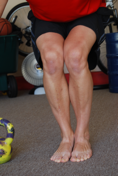
Stand barefoot with your feet together. While squatting into the rock bottom position, squeeze your knees and inner thighs together very forcefully. This will do two things. First, it will help you fire you adductors which will keep your lower leg vertical like a post and will stabilize you better by firing your core muscles. Second, it will force you to keep your entire foot on the ground. According to Pavel, "Think of isometric ally internally rotating the lower leg to keep your foot connected to the ground, while countering it with hip abduction."
A problem that I frequently encountered on my left leg was that every time I descended in the pistol my left big toe would come off the ground. I would disconnect the medial side of my foot from the ground.
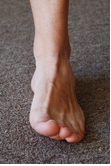
After spending some time with Pavel and having him dissect my pistol technique, he informed me that I was losing strength in my legs because of my left big toe issue. When the bottom of you first metatarsal (big toe) isn't connected to the floor you will fail to adequately recruit the quadriceps. This is a serious problem because without the quads helping out you will have a very hard time rising up out of the bottom position. The glutes and hamstrings need to work in concert with the quadriceps for a smooth yet powerful pistol.
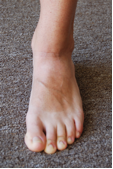
Make sure that your weight distribution in the foot is 50/50. On the contrary, if you collapse your foot inwards (pronated) and let the pinky side of your foot come off the ground you will fail to activate the glutes, hamstrings and IT band. That is why it is essential that you keep both sides of the foot well planted and rooted into the floor. A good pistol starts from a balanced foot position and its' connectedness to the ground
The following photo demonstrates the points on the bottom of your foot that you will need connected to the floor.
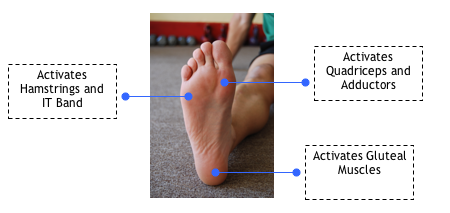
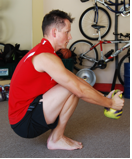
If you find your big toe leaving the floor revisit this drill as often as needed until you are able to successfully keep those points touching the ground at all times. Most people will need to hold onto a small kettlebell (usually an 8kg or 12kg kettlebell) to act as a counter balance. By all means if you have the mobility to get down into the bottom position without a kettlebell, don't use one. However, if you are like me, you will need a small weight in your hands to act as a counter balance.
Step # 2
Once you are down in the bottom position with your knees squeezed together, extend one leg straight out in front of you. Stay in the bottom position and keep switching back and forth between legs. Which leg feels weaker and less stable? When you are on one leg are you able to keep your weight distributed evenly in the foot? Try your best to not slip back into your compensations. Work the dysfunctional pattern until it becomes automatic!
Step # 3When you are able to keep the foot balanced on the floor and the tibia resembles a vertical shaft almost like a post sticking in the ground, you can attempt the concentric portion of the pistol. By coming down with two legs and coming up with one leg you eliminating the negative or eccentric portion of the pistol and focusing only on the concentric. For most people this will be the better way to go. Most people's structures and physiology will feel so threatened by the eccentric portion of the pistol that they will resemble a drunken college student trying to walk back to the dorms after a fraternity party. Eliminate this problem by coming down into the pistol with two legs and then coming up on one leg.
Once you groove a couple of perfect concentric reps, the eccentric will be much easier as your nervous system will literally take the "parking brakes" off and allow you to powerfully pull yourself down into the bottom position. Remember that you will need to actively engage your hip flexor on the eccentric portion of the pistol. Proper breathing is essential as you will need to inhale fully through your nose deep into your abdomen. You will also need to use power breathing which means forcefully making a "grunt" or "hissing" sound as you come out of the bottom position.
The above techniques allowed me to achieve a solid pistol on my left leg, something I was never able to do until now. Apply these principles and let me know how they have worked for you!
Train with Purpose!!!
Franz Snideman
RKCTL, CK-FMS
franzsnideman@earthlink.netwww.revolutionlajolla.com
Back